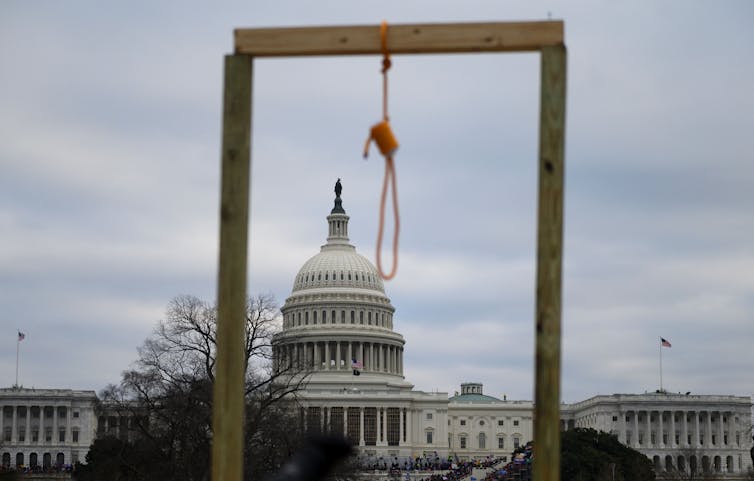from The Conversation
— this post authored by Arie Kruglanski, University of Maryland
President Joe Biden’s fundamental pitch to America has been about dignity and respect. He never tires of repeating his father’s words that “a job is about more than a paycheck, it is about … dignity … about respect … being able to look your kid in the eye and say, ‘Everything is going to be OK.’”

Please share this article – Go to very top of page, right hand side, for social media buttons.
In strikingly similar language, Princeton economists Anne Case and Angus Deaton affirm that “jobs are not just the source of money.” When jobs are lost, they wrote in 2020:
“it is the loss of meaning, of dignity, of pride, and of self respect … that brings on despair, not just or even primarily the loss of money.”
Unemployed Blackjewel coal miners, their family members and activists man a blockade along railroad tracks leading to their old mine on Aug. 23, 2019, in Cumberland, Kentucky. Scott Olson/Getty Images
I am a psychologist who studies the human quest for significance and respect. My research reveals that this basic motivation is a major force in human affairs. It shapes the course of world history and determines the destiny of nations. It underlies some of the chief challenges society is facing. Among others, these are:
- The suicides – known as “deaths of despair” – of working-class Americans
- White supremacist movements
- Systemic racism
- Islamist terrorism
- The proliferation of conspiracy theories
- The growing rift in the Republican Party between moderates and extremists
In all these cases, people’s actions, opinions and attitudes aim, often unconsciously, to satisfy their fundamental need to count, to be recognized and respected.
The very term “supremacism” betrays concern for superior standing. So do names like “Proud Boys” or “Oath Keepers.” Systemic racism is rooted in the motivation to put down one race to elevate another. Islamist terrorism targets the alleged belittlers of a religion. Conspiracy theories identify alleged culprits plotting the subjugation and dishonor of their victims. And the extremist faction of the Republican Party cares exclusively about winning, no holds barred.
Chanting ‘White lives matter! You will not replace us!’ and ‘Jews will not replace us!’ several hundred white nationalists and white supremacists march through the University of Virginia campus in Charlottesville on Aug. 10, 2017. Evelyn Hockstein/For The Washington Post via Getty Images
Triggering the quest
This quest for significance and respect must first be awakened before it can drive behavior. We don’t strive for significance 24/7.
The quest can be triggered by the experience of significant loss through humiliation and failure. When we suffer such a loss, we desperately seek to regain significance and respect. We are then keen to embrace any narrative that tells us how, and to follow leaders who show us the way.
The quest for significance can also be triggered by an opportunity for substantial gain – becoming a hero, a martyr, a superstar.
Over the past several decades, many Americans have experienced a stinging loss of significance and respect. Social scientists examined the perception of social class in the United States between 1972 and 2010. The results of their research were striking: In the 1970s, most Americans viewed themselves as comfortably middle class, defined at the time by conduct and manners – being a good neighbor and a good member of the community, exhibiting proper behavior.
In contrast, by the 2000s, membership in the middle class was determined primarily by income. And because incomes have stagnated over the past half-century, by 2010 many Americans (particularly the lower-income ones) lost their middle-class identity entirely.
Small wonder, then, that they resonated to the Trump campaign slogan that promised to make America (or Americans) “great again.”
Piling on
The COVID-19 pandemic compounds people’s sense of fragility and insignificance.
Isolation from loved ones, the danger to our own health and the dread of an economic disaster are all stressors that make a person feel weak and vulnerable. They increase the attraction to ideas that offer quick fixes for loss of significance and respect.
Though the ideas that promise restoration of significance and dignity range widely, they share an important core: They depict the promotion of different social values as paths to significance. Promoting freedom and democracy, defending one’s nation or one’s religion, advancing one’s political party – all aim to earn respect and dignity in communities that cherish those values.
When the quest for significance and respect is intensified, other considerations such as comfort, relationships or compassion are sidelined. Any actions that promote significance are then seen as legitimate. That includes actions that would otherwise seem reprehensible: violence, aggression, torture or terrorism.
An intense quest for significance does not invite reprehensible actions directly. But it boosts a person’s readiness to tolerate and enact them for the sake of significance and dignity.
The path ultimately taken depends on the narrative that identifies significance-bestowing actions in a given situation. Depending on one’s moral perspective, such actions may be seen as “good,” “bad” or “ugly.” One might have an entirely different moral evaluation of the Black Lives Matter movement and the Proud Boys and yet recognize that, psychologically, both represent routes to significance.
A noose is seen on makeshift gallows erected on Jan. 6 at the Capitol before Trump supporters violently stormed a session of Congress. Andrew Caballero-Reynolds/AFP via Getty Images
The allure of violence
A special danger to societies stems from the primordial, significance-lending appeal of violence.
Among animals, dominance is established through “trial by combat,” to use Rudy Giuliani’s recent turn of phrase at the rally before the Capitol insurrection. And as President Theodore Roosevelt famously observed, walking with a “big stick” makes other nations pay attention and respect.
Most narratives adopted by violent extremists identify a real or imagined enemy at the gates, and fighting such enemies is depicted as worthy and honorable: For Trump acolytes, the enemy is the “deep state.” For much of the far right, the enemy is, variously, immigrants, refugees, people of color, Jews, Asians, or even reptilians who plot to dominate the world.
Evangelicals view Trump’s alleged battle against the “deep state” as divinely inspired. And a QAnon message from Jan. 13, 2018, stated: “You were chosen for a reason. You are being provided the highest level of intel to ever be dropped publicly in the history of the world. Use it – protect and comfort those around you.” These views sow division among segments of society, inviting fissures and polarization.
The quest for significance and respect is a universal and immutable aspect of human nature. It has the potential to inspire great works but also tear society asunder. The formidable challenge these days is to harness the energies sparked by this fundamental motive and channel them for the betterment of humanity.
[Get the best of The Conversation, every weekend. Sign up for our weekly newsletter.]
Arie Kruglanski, Professor of Psychology, University of Maryland
This article is republished from The Conversation under a Creative Commons license. Read the original article.










